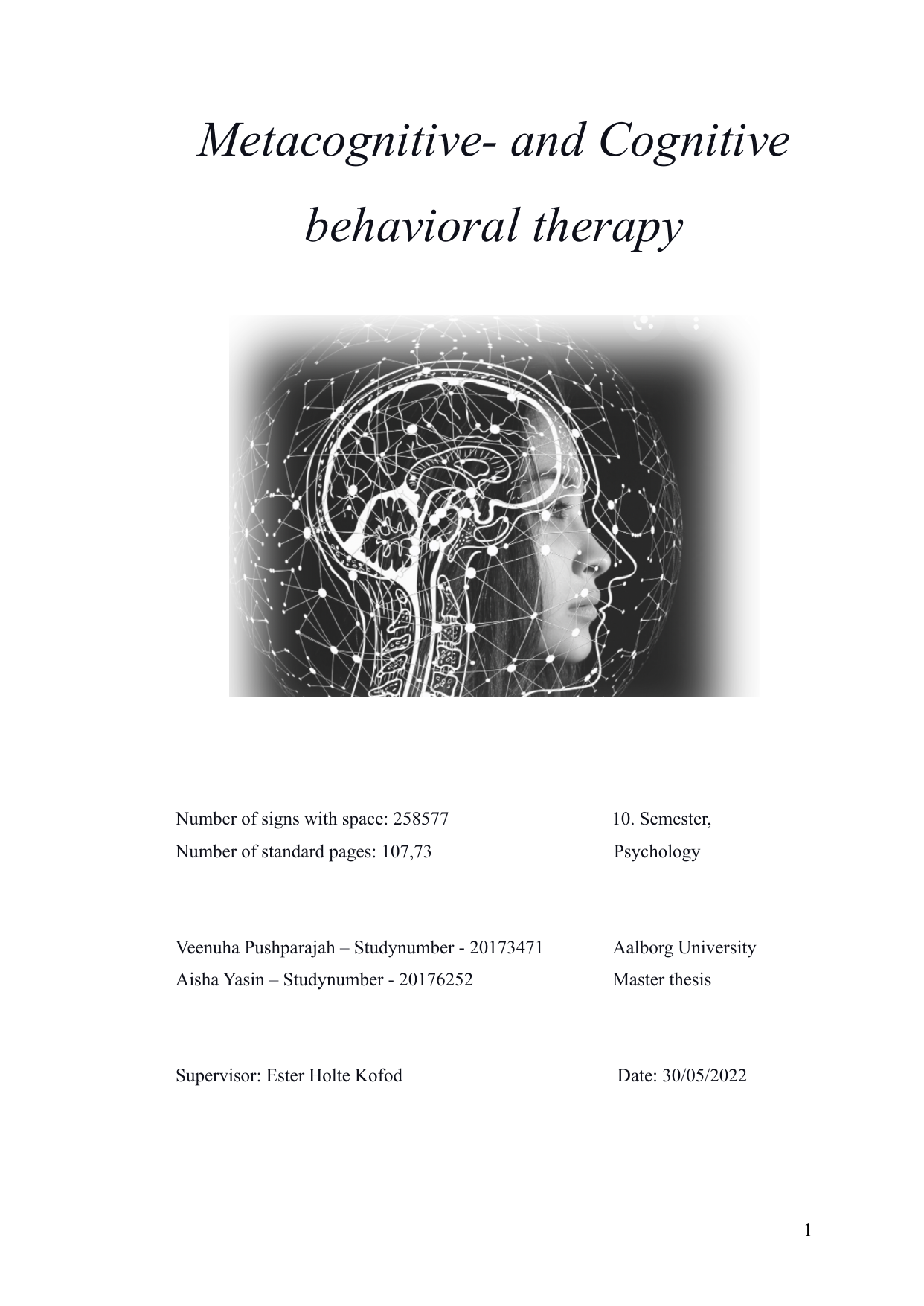
Clients' experiences of Cognitive Behavioral Therapy and Metacognitive Therapy in a Danish context
Translated title
Klienters oplevelser af Kognitiv Adfærdsterapi og Metakognitiv Terapi i en dansk kontekst
Authors
Term
4. term
Education
Publication year
2022
Submitted on
2022-05-29
Pages
107
Abstract
Background: Cognitive behavioral therapy (CBT) has become known as the "gold standard" treatment. Metacognitive therapy (MCT), on the other hand, is a newer therapeutic approach that has recently acquired popularity. Objective: Because there is a gap in the literature, this study looks into how clients in a Danish context experience therapy based on MCT and CBT. Furthermore, in Denmark, there is just one qualitative study that compares the two therapy approaches and solely focuses on the helpful factors. As a result, this study’s contribution is extremely valuable because it also focuses on hindering factors in therapy. Method: We conducted a qualitative study using hermeneutic phenomenological research method to analyze 6 participants' experiences with MCT and CBT. To do this we used a semi-structured interview. The collected data was examined using Interpretative Phenomenological Analysis (IPA). Findings: Our main findings from the analysis consisted of five themes 1) Understanding of own mental issues, 2) Method & Tools, 3) The relationship between client and psychologist 4) Group therapy vs. Individual therapy and 5) View on therapy. The themes reflected the participants' positive and negative experiences with MCT and CBT and the challenges and positive changes they encountered. Conclusion: The majority of CBT clients’ reported that the information about maintaining patterns; the cognitive model, psychoeducation and reconstructing negative automatic thinking was helpful. The majority of the MCT clients’ reported an improvement in their mental well-being. They specifically pointed towards betterment in metacognitions, rumination & worry. Our findings show that the majority of the participants who experienced CBT and MCT preferred MCT. However, our findings also show discontentment among the CBT and MCT clients, which reflected their dissatisfaction with the specific therapy methods.
Background: Cognitive behavioral therapy (CBT) has become known as the "gold standard" treatment. Metacognitive therapy (MCT), on the other hand, is a newer therapeutic approach that has recently acquired popularity. Objective: Because there is a gap in the literature, this study looks into how clients in a Danish context experience therapy based on MCT and CBT. Furthermore, in Denmark, there is just one qualitative study that compares the two therapy approaches and solely focuses on the helpful factors. As a result, this study’s contribution is extremely valuable because it also focuses on hindering factors in therapy. Method: We conducted a qualitative study using hermeneutic phenomenological research method to analyze 6 participants' experiences with MCT and CBT. To do this we used a semi-structured interview. The collected data was examined using Interpretative Phenomenological Analysis (IPA). Findings: Our main findings from the analysis consisted of five themes 1) Understanding of own mental issues, 2) Method & Tools, 3) The relationship between client and psychologist 4) Group therapy vs. Individual therapy and 5) View on therapy. The themes reflected the participants' positive and negative experiences with MCT and CBT and the challenges and positive changes they encountered. Conclusion: The majority of CBT clients’ reported that the information about maintaining patterns; the cognitive model, psychoeducation and reconstructing negative automatic thinking was helpful. The majority of the MCT clients’ reported an improvement in their mental well-being. They specifically pointed towards betterment in metacognitions, rumination & worry. Our findings show that the majority of the participants who experienced CBT and MCT preferred MCT. However, our findings also show discontentment among the CBT and MCT clients, which reflected their dissatisfaction with the specific therapy methods.
Keywords
Documents
